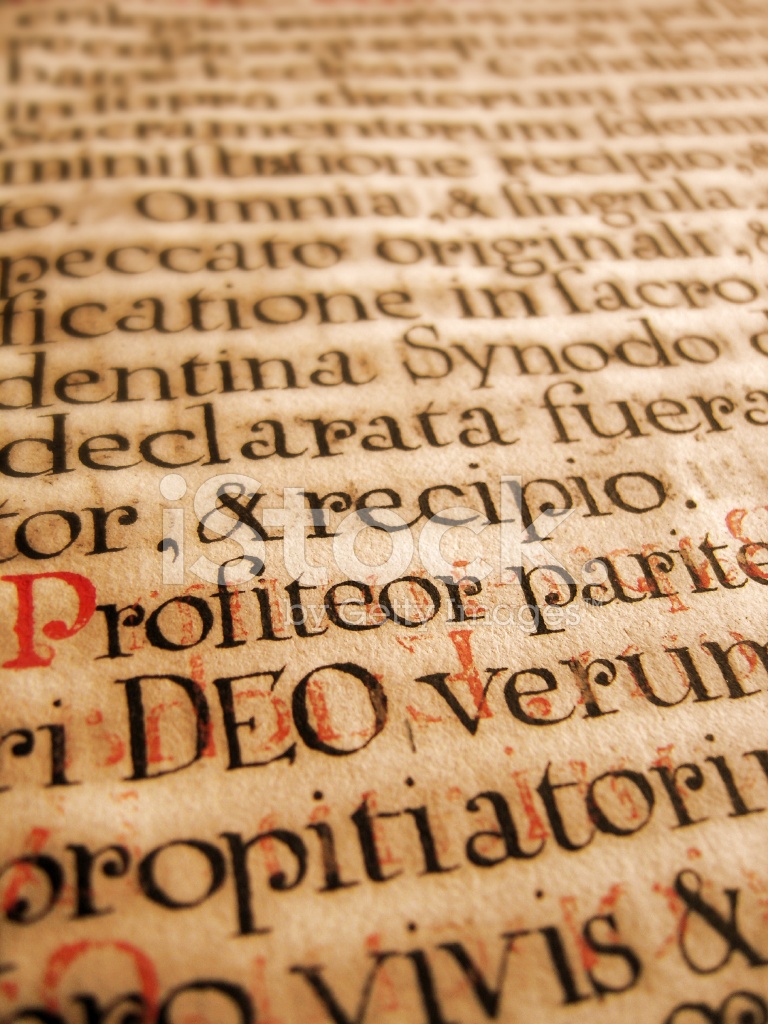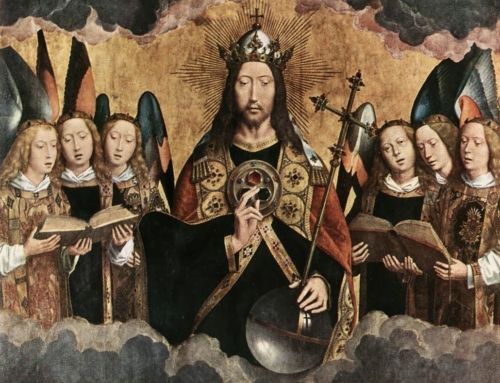The third in a series on traditional Catholic Worship:
At the solemn High Mass on Sundays at Our Lady of the Rosary, Greenville the congregation join the choir in singing or saying certain parts of the Mass in Hebrew, Greek and Latin. Every Alleluia and Amen are from the Hebrew. The Kyrie Eleison is in Greek. The Gloria, Sanctus, Agnus Dei and Paternoster are sung in Latin to Gregorian Chant. I’ll write another blog post about sacred music, but today, why use ancient languages?
First I should point out that there is nothing particularly sacred about Hebrew, Greek or Latin per se. There are many languages that traditional worshippers in various religions and denominations consider to be special or even sacred. Conservative Evangelical Protestants, for example, venerate the King James Version of the Bible and speak in “thees” and “thous” and add “eth” to the end of verbs. Conservative Anglicans love the seventeenth century language of Cranmer’s prayer book. Russian Orthodox believers venerate Old Slavonic. Copts use Coptic, Georgian Orthodox Old Georgian. The examples could be multiplied in other religions too. Some sects of Buddhism use the “sacred” language of Pali. Zoroastrianism- Avestan. Hinduism – Old Tamil or Sanskrit. If you’re interested check out a full list of sacred languages here.
So Hebrew, Latin and Greek are not intrinsically sacred any more than Avestan, Old Tamil, Old Slavonic or seventeenth c. English. Neither is Latin especially magical. Sometimes one hears traditionalists Catholics breathlessly claim, “But the devil really hates Latin! Exorcists say that when the prayers are said in Latin the devils are terrified!!” Yes, well maybe but then again maybe not. I asked an exorcist about this and he said, “Yes. When we use Latin the rite does seem to be more effective, but this is not because there is anything specially magical about Latin. Instead, because of the use of Latin the people involved in the exorcism are much more integrated and subsumed into the authority and tradition of the Church. Also people who venerate the Latin also happen to be those who have more commitment and faith in what is going on.” This seemed like a sensible answer–affirming the “power” of Latin while still dismissing any magical powers to Latin in and of itself.
So why use Hebrew, Latin and Greek in the liturgy? Doesn’t it make more sense to use language everybody understands? I’m wary of the utilitarian and pragmatic solutions when it comes to liturgy. Liturgy, like art, defies a pragmatic approach–else all art would be nothing more than advertising or illustrations for practical manuals. Instead I think the answer the exorcist gave helps to explain why we use Latin and Greek. When we use the ancient languages of the church we immerse ourselves more fully into the antiquity and deep roots of our faith. We use the words our ancestors used and join with them in a common tongue. This helps us to transcend our ordinary, daily lives. Furthermore, the ancient languages have a nobility and dignity to them that helps us transcend the quotidian vulgarity of our everyday speech.
There is another aspect to consider: what happens when you use another language? When I speak French or Spanish or German I experience another culture, another world and I see my own world and my life from a fresh perspective. To learn another language is therefore a way to transcend my world–to open up to a new way of seeing and a new way of being. This is a subtle thing, but a powerful experience nonetheless. As I use the other language I step out of my ordinary world into a different world.
The same happens when I use the ancient languages of worship. I go through the wardrobe. I step into the Narnia of Catholic worship. I am out of this world and into the world of the saints and angels.
Finally, this use of a different language takes me beyond the denotative meaning of the words. In using a language I “don’t understand” I understand it more deeply. I understand it with the heart not just the head. An analogy is attending an opera in Italian. I don’t understand what the fat lady is singing word for word literally, but it’s ok. I know the basic story. I know she has been betrayed by her lover and her heart is broken. I know she is weeping for her dead baby and cursing the man who killed it. I connect with the story at a deeper level than simply understanding the literal word for word lyrics, and when music and words combine (as they do in opera and the liturgy) the effect in the mind and heart is subtle and powerful.
A reader has also pointed out that the three languages used on the inscription: Jesus of Nazareth, King of the Jews which Pilate placed over Our Lord’s head on the cross were written in Hebrew, Latin and Greek. The use of these three languages therefore helps to echo the fact that every Mass is a re-presentation of the death of Our Lord.
All of this is packed into the simple use of ancient languages in worship and oh, I forgot the other thing: To use ancient languages in worship is totally Vatican 2. The Vatican 2 document on worship–Sacrosanctum Concilium directs us to use Latin as the primary language of the Mass. It has been blocked out in many places but it was never supposed to be. If you are interested in learning more about this topic read Sacrosanctum Concilium here and you might want to read my book Letters on. Liturgy.







Leave A Comment
You must be logged in to post a comment.